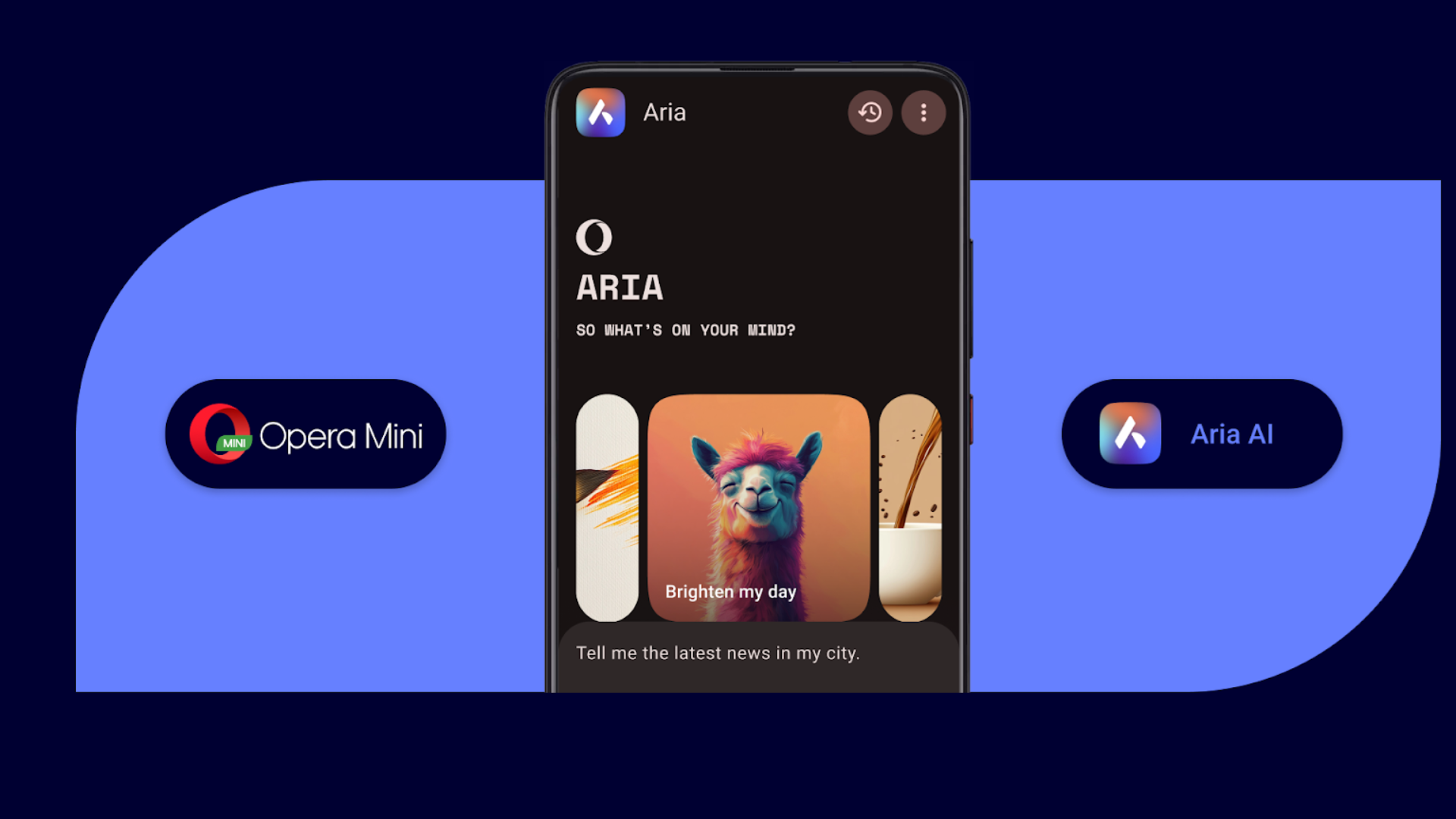Docusign expands beyond signatures with new AI-powered contract management tools
For about 20 years, Docusign has been known as a tool for collecting digital signatures—helping businesses replace paper forms with electronic versions that are just as secure and legally binding. Just over a year ago, the company announced its development of an “intelligent agreement management,” or IAM, platform. This platform uses AI not only to gather signatures but also to assist with creating new agreements and organizing contracts after they’ve been signed. These features contributed to strong earnings in Docusign’s most recent quarter, beating analyst expectations and helping customers transform contracts from hard-to-manage text files and paper printouts into actionable data. “It’s literally a revolution in how agreements are managed inside of companies,” says Allan Thygesen, Docusign’s CEO. Traditionally, even digitally signed documents are still stored as word processing files or PDFs, often scattered across company servers and cloud systems. Although critical to company operations—from hiring to product sales—”Businesses really run on agreements,” says Docusign Chief Revenue Officer Paula Hansen. Yet these documents are often difficult to scan and analyze systematically. That makes it challenging to answer even basic questions, such as which agreements are up for renewal next month, without time-consuming human review. “It really should be structured data that’s managed by software,” says Dmitri Krakovsky, Docusign’s chief product officer. “But in fact, it usually sits in text somewhere—you cannot interrogate the contract.” Docusign’s IAM platform aims to solve that by giving customers a centralized space to store and track contracts—including those housed in other cloud systems—reducing the need to hunt down relevant files. Its AI tools can automatically ingest, analyze, and search contracts. Meanwhile, an automation platform called Maestro helps companies build workflows around agreements, such as collecting customer data via webforms, gathering signatures, and verifying signer identities. Once signed, contracts can be saved automatically, and Maestro can log relevant data to third-party systems like Salesforce. [Image: Docusign] Now, Docusign is unveiling a suite of new features to make it easier for users to collaborate on contracts, track compliance, review them with AI, and verify the identity of signers. Launching at this week’s Docusign Momentum conference, a new AI engine called Docusign Iris will leverage the company’s deep contract experience to apply the most suitable AI models for various tasks. “We get to benefit from our deep understanding of how agreements are structured,” Thygesen says. “There’s sort of an inherent meta-structure to agreements, and therefore an ability to develop better models for extraction.” New virtual workspaces will enable collaboration on complex, multistep agreements. A feature called Obligation Management will automatically extract and highlight what each party is required to deliver and when—ensuring deadlines aren’t missed. This data can also be integrated into other software, like procurement management tools, eliminating the need for manual data entry, Krakovsky explains. [Image: Docusign] By next month, Docusign plans to release a beta version of a new feature called Agreement Desk—a ticketing system that helps companies organize and manage contract-related tasks, similar to developer or help desk systems. It’s designed for use across departments—not just legal—supporting teams like sales, HR, and procurement. Agreement Desk offers visibility into task statuses and required actions. New contract prep tools will also make it easier to populate templates with data from across a company’s systems. Later this year, Docusign expects to roll out more advanced AI agents that can further automate contract processes. These tools will recommend next steps, highlight contracts up for renewal, flag potential issues, and even generate draft communications. Enhanced AI review features will identify contract terms that conflict with company policies, which can be written in natural language. Users can continue editing contracts in familiar tools like Microsoft Word or Google Docs, where AI-suggested redline changes will also appear, says Thygesen. That’s important for a solution meant to enhance—rather than replace—existing workflows. “Trying to get people to move out of the tools that they like to work in—email, Word—has not ended well for anyone,” he says. No matter the tools or workflows, Docusign’s management and AI features are designed to help customers avoid missed opportunities caused by delays or overlooked deadlines. [Image: Docusign] Some customers are already seeing the benefits. Kelly Park Capital, which connects independent financial advisers and their clients with investment opportunities like hedge funds and private equity, uses Docusign’s systems to digitize and manage complex investment subscription
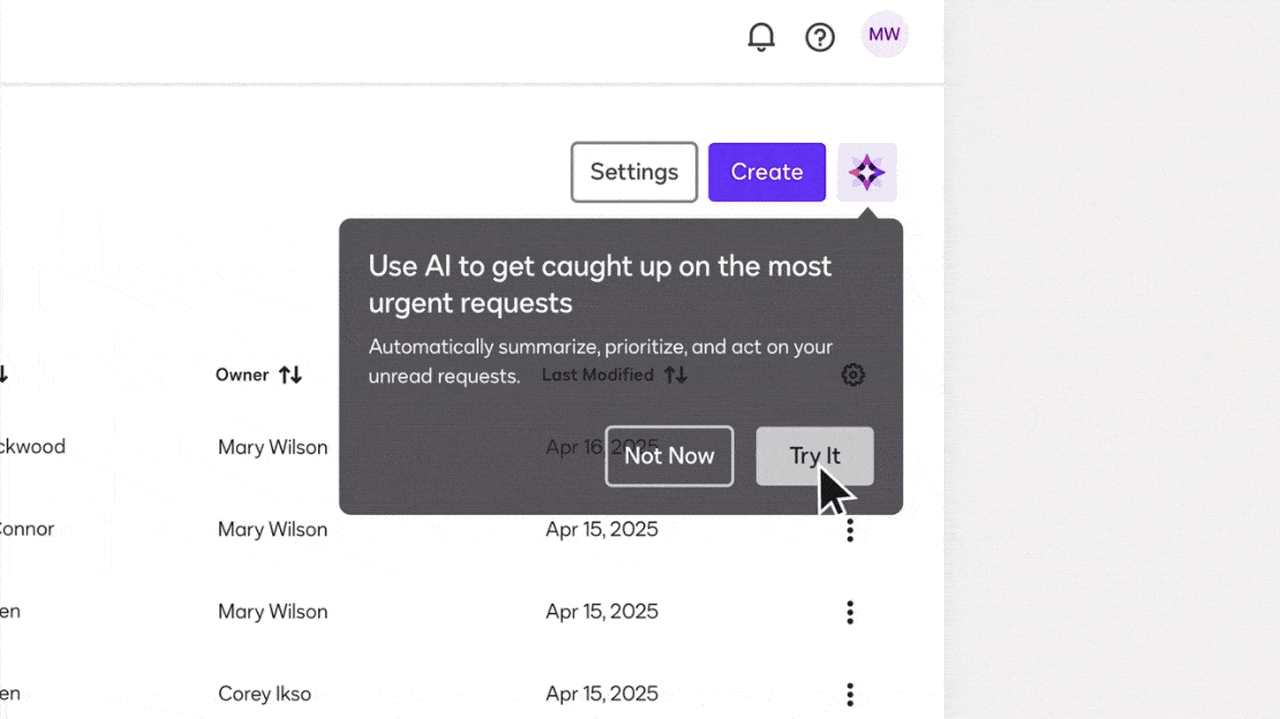
For about 20 years, Docusign has been known as a tool for collecting digital signatures—helping businesses replace paper forms with electronic versions that are just as secure and legally binding. Just over a year ago, the company announced its development of an “intelligent agreement management,” or IAM, platform. This platform uses AI not only to gather signatures but also to assist with creating new agreements and organizing contracts after they’ve been signed. These features contributed to strong earnings in Docusign’s most recent quarter, beating analyst expectations and helping customers transform contracts from hard-to-manage text files and paper printouts into actionable data.
“It’s literally a revolution in how agreements are managed inside of companies,” says Allan Thygesen, Docusign’s CEO.
Traditionally, even digitally signed documents are still stored as word processing files or PDFs, often scattered across company servers and cloud systems. Although critical to company operations—from hiring to product sales—”Businesses really run on agreements,” says Docusign Chief Revenue Officer Paula Hansen. Yet these documents are often difficult to scan and analyze systematically. That makes it challenging to answer even basic questions, such as which agreements are up for renewal next month, without time-consuming human review.
“It really should be structured data that’s managed by software,” says Dmitri Krakovsky, Docusign’s chief product officer. “But in fact, it usually sits in text somewhere—you cannot interrogate the contract.”
Docusign’s IAM platform aims to solve that by giving customers a centralized space to store and track contracts—including those housed in other cloud systems—reducing the need to hunt down relevant files. Its AI tools can automatically ingest, analyze, and search contracts. Meanwhile, an automation platform called Maestro helps companies build workflows around agreements, such as collecting customer data via webforms, gathering signatures, and verifying signer identities. Once signed, contracts can be saved automatically, and Maestro can log relevant data to third-party systems like Salesforce.
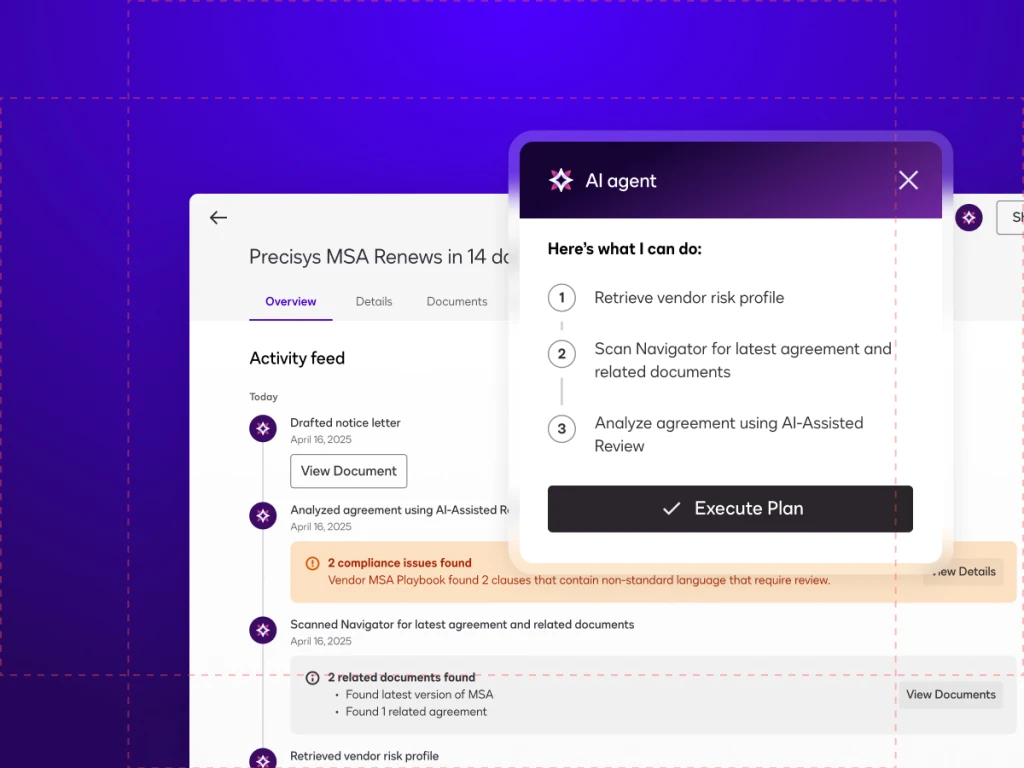
Now, Docusign is unveiling a suite of new features to make it easier for users to collaborate on contracts, track compliance, review them with AI, and verify the identity of signers.
Launching at this week’s Docusign Momentum conference, a new AI engine called Docusign Iris will leverage the company’s deep contract experience to apply the most suitable AI models for various tasks. “We get to benefit from our deep understanding of how agreements are structured,” Thygesen says. “There’s sort of an inherent meta-structure to agreements, and therefore an ability to develop better models for extraction.”
New virtual workspaces will enable collaboration on complex, multistep agreements. A feature called Obligation Management will automatically extract and highlight what each party is required to deliver and when—ensuring deadlines aren’t missed. This data can also be integrated into other software, like procurement management tools, eliminating the need for manual data entry, Krakovsky explains.
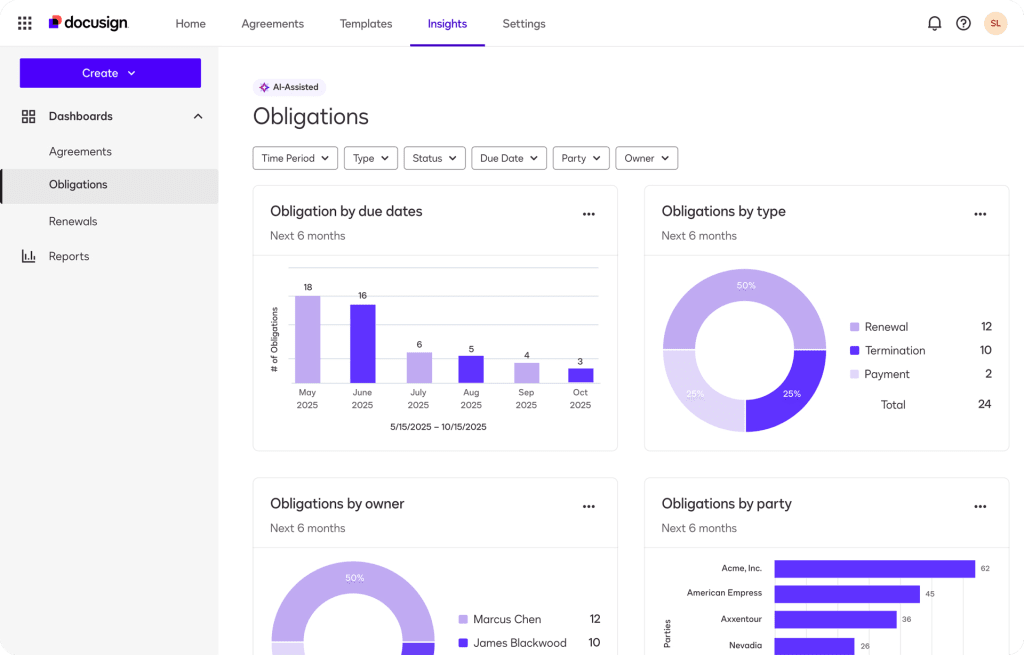
By next month, Docusign plans to release a beta version of a new feature called Agreement Desk—a ticketing system that helps companies organize and manage contract-related tasks, similar to developer or help desk systems. It’s designed for use across departments—not just legal—supporting teams like sales, HR, and procurement. Agreement Desk offers visibility into task statuses and required actions. New contract prep tools will also make it easier to populate templates with data from across a company’s systems.
Later this year, Docusign expects to roll out more advanced AI agents that can further automate contract processes. These tools will recommend next steps, highlight contracts up for renewal, flag potential issues, and even generate draft communications. Enhanced AI review features will identify contract terms that conflict with company policies, which can be written in natural language.
Users can continue editing contracts in familiar tools like Microsoft Word or Google Docs, where AI-suggested redline changes will also appear, says Thygesen. That’s important for a solution meant to enhance—rather than replace—existing workflows.
“Trying to get people to move out of the tools that they like to work in—email, Word—has not ended well for anyone,” he says.
No matter the tools or workflows, Docusign’s management and AI features are designed to help customers avoid missed opportunities caused by delays or overlooked deadlines.
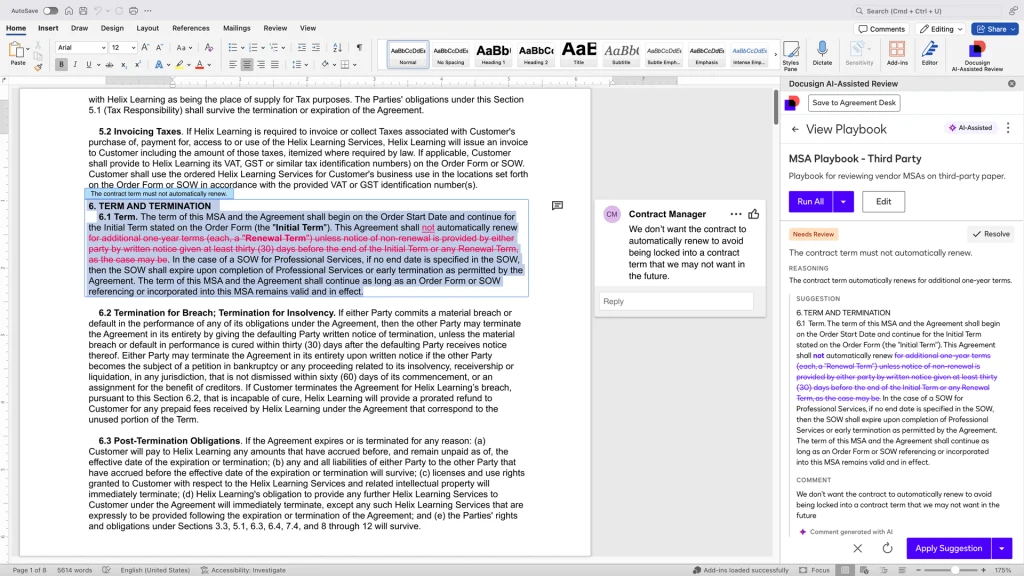
Some customers are already seeing the benefits. Kelly Park Capital, which connects independent financial advisers and their clients with investment opportunities like hedge funds and private equity, uses Docusign’s systems to digitize and manage complex investment subscription documents.
“These documents are hundreds of pages long, typically, and they are filled with dense, archaic, legalistic, regulatory-driven language,” says Dean Rubino, managing partner at Kelly Park Capital. “So if you’re not used to that, and you’re trying to do it in mass, it’s almost impossible.”
Using Docusign technology, the company collects preliminary data—like client info and investment types—via web forms, which Maestro then automatically adds to the correct digital template. This saves around 70% of the time previously spent manually filling contracts and reduces the risk of transcription errors, Rubino says.
Docusign’s upcoming workspace feature will also help Kelly Park Capital collaborate more effectively on documents. Meanwhile, AI tools may soon enable automatic updates to templates—useful for applying regulatory changes across similar agreements.
While other tools exist for managing legal documents and using AI to analyze them, Docusign leaders believe their long history with contracts—and the trust of nearly 1.7 million customers—gives them an edge.
“It’s still really early days,” says Hansen. “But the results are exceeding our expectations, and we’re fortunate to have a really large customer base and a customer base that trusts us.”




























![[Webinar] AI Is Already Inside Your SaaS Stack — Learn How to Prevent the Next Silent Breach](https://blogger.googleusercontent.com/img/b/R29vZ2xl/AVvXsEiOWn65wd33dg2uO99NrtKbpYLfcepwOLidQDMls0HXKlA91k6HURluRA4WXgJRAZldEe1VReMQZyyYt1PgnoAn5JPpILsWlXIzmrBSs_TBoyPwO7hZrWouBg2-O3mdeoeSGY-l9_bsZB7vbpKjTSvG93zNytjxgTaMPqo9iq9Z5pGa05CJOs9uXpwHFT4/s1600/ai-cyber.jpg?#)














































































































































![[The AI Show Episode 144]: ChatGPT’s New Memory, Shopify CEO’s Leaked “AI First” Memo, Google Cloud Next Releases, o3 and o4-mini Coming Soon & Llama 4’s Rocky Launch](https://www.marketingaiinstitute.com/hubfs/ep%20144%20cover.png)

















































































































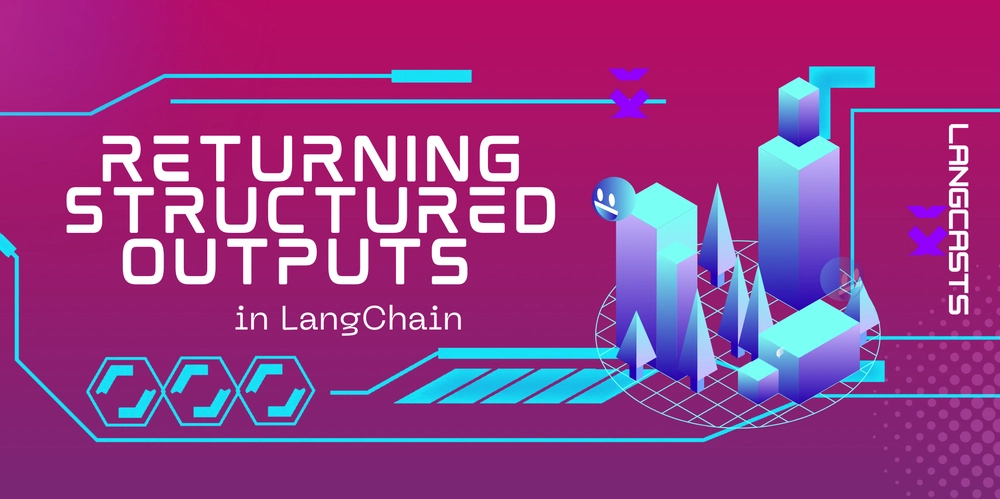



















































































![Rogue Company Elite tier list of best characters [April 2025]](https://media.pocketgamer.com/artwork/na-33136-1657102075/rogue-company-ios-android-tier-cover.jpg?#)







































































_Andreas_Prott_Alamy.jpg?width=1280&auto=webp&quality=80&disable=upscale#)





































































































![Apple Watch Series 10 Back On Sale for $299! [Lowest Price Ever]](https://www.iclarified.com/images/news/96657/96657/96657-640.jpg)
![EU Postpones Apple App Store Fines Amid Tariff Negotiations [Report]](https://www.iclarified.com/images/news/97068/97068/97068-640.jpg)
![Apple Slips to Fifth in China's Smartphone Market with 9% Decline [Report]](https://www.iclarified.com/images/news/97065/97065/97065-640.jpg)


















